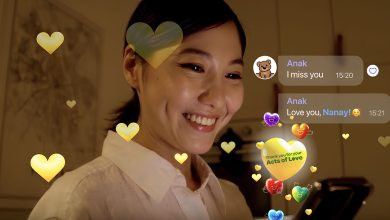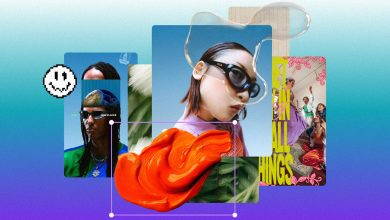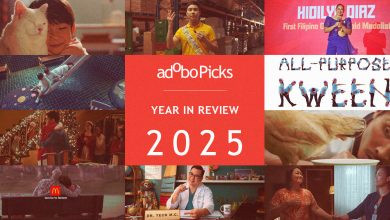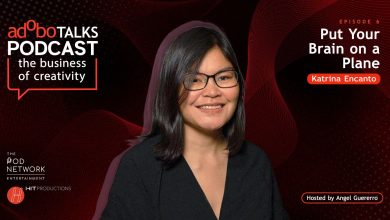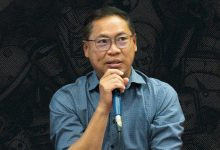CANNES, FRANCE — Rappler CEO and Nobel Prize Laureate Maria Ressa delivered one of the most powerful moments of the 2024 Cannes Lions as she accepted this year’s LionHeart Award. In her speech, Maria urged the world’s top creatives to join the fight against disinformation and, in doing so, help preserve our democratic institutions. Thousands in the auditorium across the Palais de Festival in Cannes were left moved — some in tears — as the transfixed audience gave her rousing applause and a standing ovation.
The LionHeart, one of the Festival’s most prestigious awards, is given to “an individual who has harnessed their position to make a significant and positive difference to the world,” said Philip Thomas, Chairman of the Cannes Lions Festival of Creativity. “We give them this award, wherever they come from, to help raise the profile of what they do within our community and to help them build the relationships and partnerships they need to help their cause.”
Maria was given the honor for her “absolute dedication to democracy and free speech,” announced Philip. Previous award winners include activist Malala Yousafzai, former US Vice President Al Gore, and former UN Under-Secretary-General and Executive Director of UN Women Phumzile Mlambo-Ngcuka.
A multi-awarded investigative journalist, Maria’s name became synonymous with the struggle for press freedom in the Philippines, where she and Rappler saw relentless harassment under the Duterte administration. Her platform bravely exposed the corruption and human rights abuses behind the administration’s brutal war on drugs, and despite being saddled with death threats, cyber-attacks, and endless legal battles, Maria and her team at Rappler continue to hold the line for journalistic integrity to this day. Her tireless work in upholding press freedom — widely recognized to be a pillar of democracy —led to her being given the Nobel Peace Prize in 2021, among numerous other accolades.
After thanking the audience, Maria recalled how, in Rappler’s early days, she became fully aware of how impactful the advertising industry can be. “In 2014, just a year after our little start-up got off the ground, a campaign we worked on for Pantene, with David Guerrero, won a Lion. It was the first time I personally felt the power of your industry for good,” she shared. “It broke stereotypes for women around the world.”
She then shifted to the crux of her message: how journalism itself is under threat and, with it, democracy as we know it. Her personal experience with the government’s harassment of Rappler set the tone: “In January 2018, when the Philippine government first tried to shut Rappler down, advertisers received phone calls, and within four months, we lost 49% of our advertising revenues. But 51% had the courage to stay.”
“It is tough to be a journalist today,” she continued. “In order to keep doing my job, I had to be okay with going to jail for the rest of my life. It was over a century in jail combined, all those sentences. In order to be here today, I had to ask the Philippine Supreme Court for approval to travel.”
Maria was quick to remind the audience that the erosion of press freedom isn’t unique to the Philippines; rather, it is a worldwide crisis.
“It’s been a long time. But I can’t complain, ‘cause in a strange way, I am lucky,” she said. “Every year for the last decade, more journalists are harassed, jailed, or killed. Last year, the number of journalists increased 44%, the number of journalists killed because of Gaza. There are more novel ways of silencing journalists today, from the death of our business model — which you can help control — to a time when free speech is used to pound free speech to silence. So if you’ve been the target of attacks, you know what can happen.”
She recounted how, at her Nobel lecture in 2021, she warned the audience about how the shifting media landscape — especially when it came to journalism — was a disaster unfolding before our very eyes. “I said an atom bomb exploded in our information ecosystem when journalists lost our gatekeeping powers to technology companies. And the death toll from that… Well, that death toll is still rising.”
“In humanity’s first contact with AI, social media turned our world upside-down by rewarding lies, amplifying fear, fueling hatred,” Maria continued. “Imagine lies spreading six times faster in 2018; that created a distribution system that is dangerous to journalists, that doesn’t give journalism a chance, that is dangerous to brands. This outrage economy built on our data, microtargeting us, has transformed our world. It insidiously manipulates, not just us, but the people we serve, igniting the worst of who we are and fuelling our blackest emotions.”
“These next three sentences, I keep saying over and over — I feel like Sisyphus and Cassandra combined— ever since 2016, when I was getting an average of 90 hate messages per hour on social media. Without facts, you can’t have truth. Without truth, you can’t have trust. Without these three, we have no shared reality, no rule of law, no democracy.”
The explosion of generative AI has exacerbated the situation to an alarming degree. She added, “That triggered another arms race, and the failure of democratic governments to hold tech companies in check— that is the least-regulated industry globally today — the failure to put laws in place to protect the public; each day of impunity means these governments lose more power.”
“It is a tech coup in plain sight and, like social media, LLMs or Large Language Models, they’re not angry. In fact, they spew lies — except this time, they use a chatbot, and it’s called ‘hallucinations.’ They sound like facts, but they’re not. And it is about to get worse.”
“You’ve heard the phrase ‘enshittification of the internet’? With deepfakes, you won’t be able to tell what’s real and what’s not,” she said. “It’s not a coincidence that 71% of the world today lives under autocratic rule. Globally, we are electing illiberal leaders democratically. Because if we don’t have integrity of facts, we cannot have integrity of elections.”
This, Maria expressed, is why we are currently at a major turning point in history. “And in this 2024, the tipping year of democracy, where about half of the world is voting in more than 60 elections, there will be less safety measures in place in the technology that connects and rules us,” she said, holding up her phone.
“So this race to the basement began when Elon Musk bought Twitter. Today—as the UK [on] July 4th, France, Germany, the US — as these countries prepare to vote after the EU elections, there are far less safeguards for each of us,” Maria warned. “That means people will get less news in their feeds, they’ll get more propaganda, more outrage, more hate. We will have to struggle for agency.”
“The youth, your kids, are particularly vulnerable because they’re mildly addicted to the technology they use. They get their news on social media, mixed in with propaganda. They get less sleep, are more distracted, have higher incidence of ADHD, more eating disorders for teenage girls, and more suicides.”
All this was not to depress the audience, but to urge them to act, Maria explained. The advertising industry is in a unique position to turn this tide of disinformation, restore the respect for journalistic values, and help stave off the death of democracy as we know it.
“So here’s my request for you, along with my very effusive thanks: Please put your expertise to work,” she implored. “Imagine facts as a brand. It’s not doing well because it’s boring, right? What would the world’s best creatives do to strengthen the brand ‘Facts’? And then, please also add another brand: tackle ‘Truth’. What would you do to strengthen ‘Truth’? Because if we can do both ‘Facts’ and ‘Truth’, build them as a brand, then you restore trust, which every brand in the world needs to grow.”
“That brings along the best of all of us, the best of humanity: the ability to lower our shields, to be vulnerable, to work together, and to build a better world.”
“We need you,” she told the audience. “This is the moment because the window is closing. What you do today, what you choose, will matter. We cannot let lies win. This can get better with your help, so please: join us. Thank you.”



